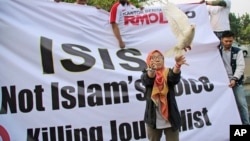In his address to the United Nations this week, President Barack Obama spoke “directly to young people across the Muslim world,” asking them to stay on a path of education and reject the message of Muslim extremists "who call you away from this path.”
But experts say that will be difficult, as there are many factors causing young Muslims in the Arab world to heed the call of extremist groups like the so-called Islamic State, as known as IS or ISIL.
“Unfortunately the concept of calling Muslims to fight infidels in the dawn of Islam is still valid in some approved traditional resources of Islamic education, and ISIL is taking it out of context and to the individual level,” said Twafik Hamid, a senior fellow at the Potomac Institute for Policy Studies.
Hamid speaks from personal experience.
Twenty five years ago, Hamid was a member of Egypt’s extremist group al-Gamaa al-Islamiya alongside Ayman al-Zawahri, who later became al-Qaida’s second in command and remains a fugitive.
“I was an absolute failure in all aspects of life when I joined the group, but I felt superior to others because I thought I joined Jihad to serve God,” Hamid said. “Some are attracted to join because they are poor or unemployed, and a group with resources like ISIL pays its members and provides easy marriages at no cost."
Imam Feisal Abdul Rauf, chairman of the Cordoba Initiative, an inter-faith organization dedicated to improve Muslim-Western relations, said while socio-economic factors play a big role, political exclusion also has its impact.
“When a political Islamic party is called a terrorist organization and is banned, like what happened under General Sisi in Egypt, or when Sunni community is excluded, like what happened under Iraqi Prime Minister Maliki, that gives rise to a greater militancy in the name of Islam,” he said.
In his UN speech, Obama said that the United States is not and never will be at war with Islam.
“When it comes to America and Islam, there is no 'us' and 'them' — there is only 'us,' because millions of Muslim Americans are part of the fabric of our country,” he said.
But Caitlin Ryan, assistant professor of International Relations at Ohio University, said the west contributes to the hateful ideology promoted by militants.
“The dichotomy of framing us in the west as inherently more rational or better made it easier for ISIL to attract young people and foreign fighters based on their dislike of western intervention,” Ryan said.
More than 120 Muslim scholars from around the world recently joined in an open letter to the “fighters and followers” of the Islamic State group, denouncing them as un-Islamic by using the most Islamic of terms.
Relying heavily on the Koran, the 18-page letter released at the Press Club in Washington dissects the militants' extremist ideology.
Nihad Awad, executive director of the Council of American-Islamic Relations, who released the letter, said it aims to offer a comprehensive, “point-by-point” Islamic rebuttal to the group's philosophy and the violence it has perpetrated.
The authors include well-known religious and scholarly figures in the Muslim world, including Sheikh Shawqi Allam, the grand mufti of Egypt, and Sheikh Muhammad Ahmad Hussein, the mufti of Jerusalem.
Repudiation of the terrorist organization's ideology has also come from influential Sunni authorities based in Saudi Arabia and Egypt.
“Terrorism is contrary to the purpose of the great religion of Islam, which came as a mercy to the world, and to ensure the system of worldly coexistence,” the Saudi Council of Senior Scholars said. “Any Muslim who thinks that Jihad means joining a terrorist group is ignorant and has gone astray.”
Egypt’s Dar al-Ifta — the house of Islamic rulings — launched an online campaign to combat the IS ideology and explain the meaning of Jihad in Islam.
But experts say more needs to be done in Arab and predominantly-Muslim countries.
“On the socio-economic front, these countries should provide jobs for university graduates that would give them dignified living,” said Rauf, head of the inter-faith program. “On the issue of ideology, they need to raise Muslims on the real universal values of Islam; justice, freedom of religion, protection of life, property, family values and human dignity.”
But Hamid said an alternative approach to a traditional Islamic way of teaching can help reverse the extremist tide.
“Arab and Muslim countries should work on the mental roots by explaining the context in which specific verses of the holy Koran were calling Muslims to fight infidels, which no longer apply to our times,” Hamid said.
He also said the Muslim world must present a more accurate picture of the West to their young people.
“For example, many young Muslims may hate the U.S., thinking that Muslims in America are very badly treated, but they may change their minds if they realize that Muslims in America were able to build thousands of mosques and Islamic schools and their median annual income is higher than any other ethnic group,” he said.
Analyst Ryan said there should be a focus facing grievances that push young Muslims to join violent extremist groups.
“When you systematically exclude moderate Islamist parties from politics, you drive them underground and you end up radicalizing those parties,” Ryan said.
Attention needs to focus too on language used in the media, she said.
“The first step is to stop framing the terrorist group as the Islamic State when it is not, because that allows people who have any sort of leaning towards political Islam to feel torn between being completely secular or the undesirable option [of joining] with such a terrorist group,” she said.











